The young Essex carers whose help equates to a full-time job
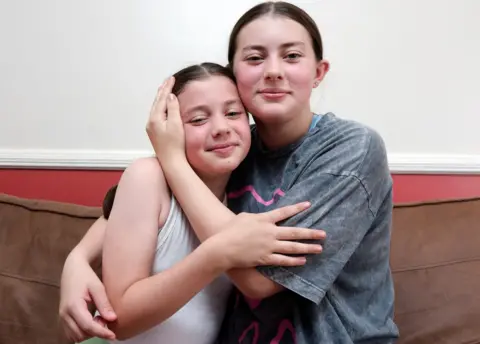 BBC
BBCOn schooldays, 11-year-old Flo and her sister Grace, 15, get up at 06:10 to do a string of jobs before school. The sisters are among a rapidly expanding number of young carers. What is driving this rise and is enough being done to support the children supporting others?
Three years ago, an assessor from Essex Young Carers arrived at Flo and Grace's home and asked the girls about the chores they did.
When the total hours were totted up, it emerged the girls spent about 40 hours each week between them caring for their mother, Kayleigh.
The sisters are part of a growing population of young carers giving more than 20 hours of weekly support to loved ones. Census data suggests there are 20,945 under-18s providing between 20 and 49 hours of care, up 7% from 19,530 in 2011.
"I feel a lot of guilt," says Kayleigh, who has albinism and is blind. "Effectively they have a full-time job each week, just helping me."
The children's daily tasks include:
- Washing up
- Putting the washing on
- Applying eyedrops, four times a day
- Applying sun cream
- Reading the post and important letters
- Keeping floors clean
- Looking after the dogs
- Helping to make dinner
- Checking the cooking settings
While the children just accept their caring efforts as "what they do", Kayleigh describes her daughters as "amazing superheroes".
"There are some really low days when I just wish I was normal for them," says Kayleigh. "Then again, I know I am bringing up two incredible humans."
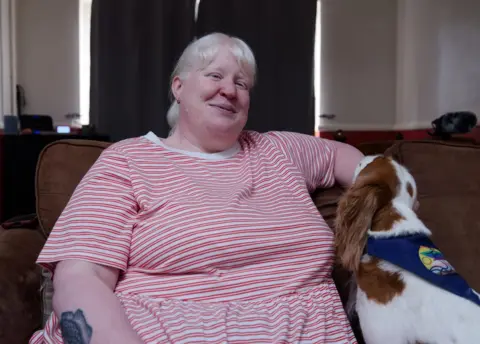 BBC
BBCAlthough Flo and Grace have always helped their mother, the care Kayleigh needed increased dramatically during the pandemic after an eye infection stripped her of much of her remaining sight.
That sight loss made navigating the outside world "such a daunting prospect".
"Everything I thought I knew, I then didn't know - I was like a toddler again and needed to be taught by my young carers," Kayleigh says.
The sisters were referred to the charity Kool Carers after their primary school head teacher overheard Kayleigh mention that her daughters read the post to her.
The support given by the charity and the chance to meet other young carers has been transformative for the sisters.
Kayleigh says the girls became "more accepting" of being young carers - "it wasn't a secret any more".
Friends have also been supportive, the sisters say.
"I don't tend to bring it up," says Flo. "But if I do tell them, then they are like, 'oh okay', and it doesn't seem abnormal after that. In fact, my friends think it is quite cool."
And despite their responsibilities and homework, Flo is heavily involved in dance and judo while Grace also does judo and is a member both of the Young Essex Assembly and the Royal Navy cadets.
She hopes one day to be a Royal Navy engineer.
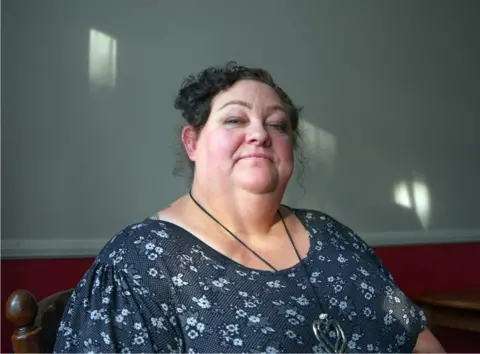 BBC
BBCHelen Murphy works as a counsellor with young carers and their families.
"Life can be tough enough for any young person these days," she says. "And when you add on their caring responsibilities it can be really quite overwhelming for them."
Issues such as loneliness and a sense of isolation are common.
"Quite often they will come to us and say 'this is just what we do and got used to'," she says. "But they will have quite complex emotions about it.
"They might feel angry or feel it is unfair but cannot really express that to the parent or parents they are caring for.
"We provide them with the space and time to express those quite natural feelings."
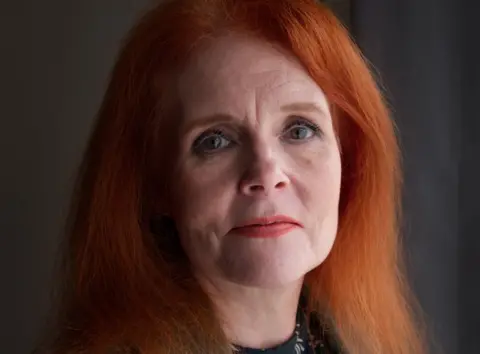 BBC
BBCThe number of young carers known to Essex County Council has risen from 2,482 in 2021 to 3,577 at the most recent count.
The council claims the rise is largely down to schools and other organisations being better at identifying young carers.
Chris Vince, the young carers service manager at Action for family Carers, says he has noticed an "increase in mental health issues caused by the cost-of-living crisis" which in turn had led to a rise in referrals.
Rachel Tungate, the founder of Kool Carers, suggests the pandemic itself has increased the number of young carers, particularly in terms of adults with complex mental health needs.
"We've noticed a massive increase in the number of young carers," she says. "Before the pandemic we were supporting 48 young carers aged eight to 18.
"We're now supporting 153 young carers and their families, which equates to more than 500 people, and we've got a waiting list of 87 young people.
"As a society, I think we are all falling short - too many young carers are still below the radar."
Asked whether there was enough support out there for young carers, Ms Tungate says: "Absolutely not. We need to ensure they feel comfortable about identifying themselves as young carers and that the support is out there for when they do."
Some young carers, she says, are missing out on education or training because of their caring responsibilities.
"We are seeing some young carers who don't go on to reach their full potential academically because they want to stay at home and care for their loved ones," Ms Tungate says.
"They are incredibly selfless."
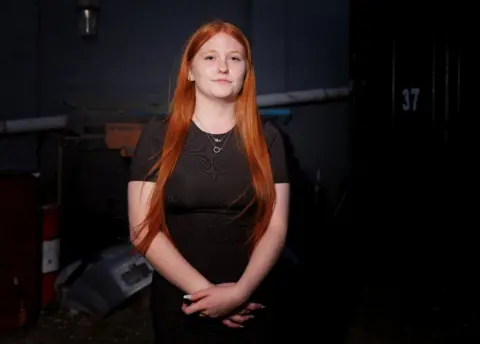 BBC
BBCYoung carer Kerri Foster, 19, lives in Basildon and desperately wants to go to university to study design.
But her family cannot afford for her to go, she says.
Her father has the neurodegenerative disorder Gordon Holmes Syndrome which has increasingly reduced his mobility. Her mother gave up work a couple of years ago to care for her husband.
"It is not really feasible for me at the moment," she says about her studies.
Instead, she has taken a full-time job in her home town to both support herself and her parents.
She says she will reassess whether or not she can go to university in a couple of years' time.
Mark Durham, the county council cabinet member responsible for the youth service, says the Essex Young Carers Service was "proactively engaging with young people and identifying more young carers".
"We are committed to helping them to feel supported too," he says.
"We work to ensure activities are age and gender appropriate, and that the role of young carers is acknowledged with their achievements celebrated.
"We aim to ensure young carers are not disadvantaged due to their caring role and have the same opportunities as their peers to enjoy life and fulfil their ambitions."
Photography: Laurence Cawley

Follow East of England news on Facebook, Instagram and X. Got a story? Email [email protected] or WhatsApp 0800 169 1830
